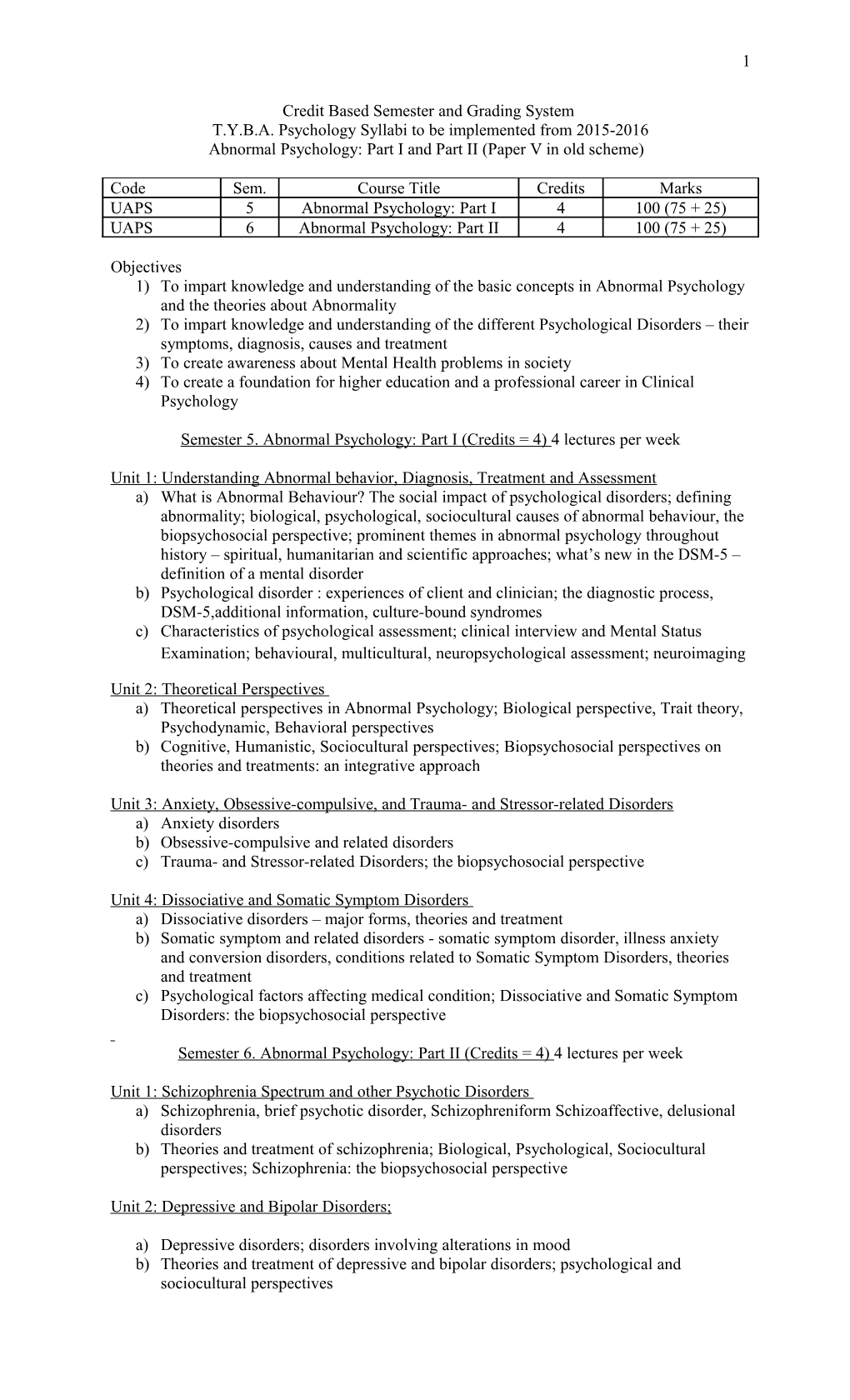1
Credit Based Semester and Grading System
T.Y.B.A. Psychology Syllabi to be implemented from 2015-2016
Abnormal Psychology: Part I and Part II (Paper V in old scheme)
Code / Sem. / Course Title / Credits / MarksUAPS / 5 / Abnormal Psychology: Part I / 4 / 100 (75 + 25)
UAPS / 6 / Abnormal Psychology: Part II / 4 / 100 (75 + 25)
Objectives
1)To impart knowledge and understanding of the basic concepts in Abnormal Psychology and the theories about Abnormality
2)To impart knowledge and understanding of the different Psychological Disorders – their symptoms, diagnosis, causes and treatment
3)To create awareness about Mental Health problems in society
4)To create a foundation for higher education and a professional career in Clinical Psychology
Semester 5. Abnormal Psychology: Part I (Credits = 4) 4 lectures per week
Unit 1: Understanding Abnormal behavior, Diagnosis, Treatment and Assessment
a)What is Abnormal Behaviour? The social impact of psychological disorders; defining abnormality; biological, psychological, sociocultural causes of abnormal behaviour, the biopsychosocial perspective; prominent themes in abnormal psychology throughout history – spiritual, humanitarian and scientific approaches; what’s new in the DSM-5 – definition of a mental disorder
b)Psychological disorder : experiences of client and clinician; the diagnostic process, DSM-5,additional information, culture-bound syndromes
c)Characteristics of psychological assessment; clinical interview and Mental Status Examination; behavioural, multicultural, neuropsychological assessment;neuroimaging
Unit 2: Theoretical Perspectives
a)Theoretical perspectives in Abnormal Psychology; Biologicalperspective, Trait theory, Psychodynamic, Behavioral perspectives
b)Cognitive, Humanistic, Sociocultural perspectives; Biopsychosocial perspectives on theories and treatments: an integrative approach
Unit 3: Anxiety,Obsessive-compulsive,and Trauma- and Stressor-related Disorders
a)Anxiety disorders
b)Obsessive-compulsive and related disorders
c)Trauma- and Stressor-related Disorders; the biopsychosocial perspective
Unit 4: Dissociative and Somatic Symptom Disorders
a)Dissociative disorders – major forms, theories and treatment
b)Somatic symptom and related disorders - somatic symptom disorder, illness anxiety and conversion disorders, conditions related to Somatic Symptom Disorders, theories and treatment
c)Psychological factors affecting medical condition; Dissociative and Somatic Symptom Disorders: the biopsychosocial perspective
Semester 6. Abnormal Psychology: Part II (Credits = 4) 4 lectures per week
Unit 1: Schizophrenia Spectrum and other Psychotic Disorders
a)Schizophrenia, brief psychotic disorder, Schizophreniform Schizoaffective, delusional disorders
b)Theories and treatment of schizophrenia; Biological, Psychological, Sociocultural perspectives;Schizophrenia: the biopsychosocial perspective
Unit 2: Depressive and Bipolar Disorders;
a)Depressive disorders; disorders involving alterations in mood
b)Theories and treatment ofdepressive and bipolar disorders; psychological and sociocultural perspectives
c)Suicide;depressive and bipolar disorders: the biopsychosocial perspective
Unit 3: ParaphilicDisorders, Sexual Dysfunctions, and Gender Dysphoria
a)What patterns of sexual behavior represent psychological disorders? Paraphilic Disorders; Theories and treatment
b)Sexual Dysfunctions; Theories and treatment
c)Gender Dysphoria; Theories and treatment; The biopsychosocial perspective
Unit 4. Personality Disorders
a)The nature of personality disorders
b)Cluster A and Cluster B personality disorders
c)Cluster C personality disorders; the biopsychosocial perspective
Note – As an Orientation to this course, the following sub-topics should be taught in brief;(questions will not be set on these sub-topics in the class test or semester-end examination) -
- Research methods in Abnormal Psychology
- Steps in the diagnostic process
- Planning the treatment; Course and outcome of treatment
Book for study
Whitbourne, S.K., & Halgin, R. P. (2014). Abnormal Psychology: Clinical Perspectives on Psychological Disorders. (7th ed.). McGraw-Hill (Indian reprint 2015)
Books for Reference
- Barlow, D.H., & Durand, V.M. (2005). Abnormal Psychology: An Integrative Approach. (4th ed.). New Delhi: Wadsworth Cengage Learning
- Beidel, D. C., Bulik, C. M., & Stanley, M.A. (2010). Abnormal Psychology. New Jersey: Pearson Prentice Hall
- Bennet, P. (2003). Abnormal and Clinical Psychology: An Introductory Textbook. Open University Press
- Butcher, J. N., Hooley, J. M., & Mineka, S., (2014). Abnormal Psychology. (16th ed.).Pearson education
- Dhanda, Amita. (2000).Legal Order and Mental Disorder. New Delhi, Sage publications pvt ltd
- Hecker, J.E., & Thorpe, G.L. (2005).Introduction to clinical Psychology: Science, practice, and ethics. New Delhi, Pearson education, Indian reprint 2007
- Kring, A.M., Johnson, S. L., Davison, G.C., &Neale, J.M. (2013). Abnormal Psychology. (12th ed.).International student version, John Wiley & Sons, Singapore
- Nolen-Hoeksema, S. (2014). Abnormal Psychology. (6th ed.). New York: McGraw-Hill.
- Oltmanns, T.F., & Emery, R.E. (2010). Abnormal Psychology.6th ed., New Jersey: Pearson Prentice Hall
- Ray, W.J. (2013). Abnormal Psychology: neuroscience perspectives on human behaviour and experience. Sage Publications, USA
